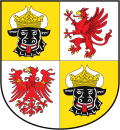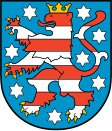List of the Prime Ministers of the German states
The list of minister-presidents of the German states contains all heads of government of the German states since 1945.
Acting Prime Ministers
The following table lists the incumbent Prime Ministers of the federal states of the Federal Republic of Germany (as of August 27, 2020) .
Overview
countries
Baden-Württemberg
State parliament in the state capital Stuttgart
| Predecessor countries from 1945 to 1952: | |||||
|---|---|---|---|---|---|
| to bathe | |||||
| Term of office | Prime Minister | Political party | government | Remarks | image |
| June 2, 1945 - December 3, 1946 |
Ministerial directorate with changing chairmen: Alfred Bund ( BCSV ), Karl Ott (independent), Adolf Schwarz (died on June 3, 1945), Paul Haußer ( DemP , from June 4, 1945), Ludwig Ganter (until August 1945), Paul Zürcher (BCSV, from September 1945), Friedrich Leibbrandt ( SPB , from January 1, 1946), Philipp Martzloff (SPB, from February 20, 1946) and Carl Diez (BCSV, from February 20, 1946) | ||||
| December 3, 1946 - April 25, 1952 |
Leo Wohleb |
BCSV later: CDU |
State Secretariat Wohleb , Cabinet Wohleb I , II , III | Official title initially "President of the State Secretariat", from 1947 "State President" |
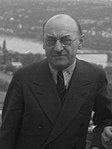 Leo Wohleb |
| Württemberg-Baden | |||||
| Term of office | Prime Minister | Political party | government | Remarks | image |
| September 24, 1945 - April 25, 1952 |
Reinhold Maier | DVP | Cabinet Maier I , II , III | First appointed by the USA, democratically confirmed in 1946 |

|
| Württemberg-Hohenzollern | |||||
| Term of office | Prime Minister | Political party | government | Remarks | image |
| December 9, 1946 - July 8, 1947 |
Carlo Schmid | SPD | Cabinet Schmid II | Appointed by France |

|
| July 8, 1947 - August 3, 1948 |
Lorenz Bock | CDU | Cabinet buck | Died in office |
 Lorenz Bock (left) |
| August 3, 1948 - August 13, 1948 |
Carlo Schmid | SPD | - | provisional | |
| August 13, 1948 - April 25, 1952 |
Gebhard Müller | CDU | Cabinet Müller |

|
|
| from 1952: | |||||
| Baden-Württemberg | |||||
| Term of office | Prime Minister | Political party | government | Remarks | image |
| April 25, 1952 - October 7, 1953 |
Reinhold Maier | DVP / FDP | Maier's cabinet | Resignation after the poor performance of the FDP Baden-Württemberg in the federal election in 1953 |

|
| October 7, 1953 - December 17, 1958 |
Gebhard Müller | CDU | Cabinet Müller I , II | Resignation because of his election as President of the Federal Constitutional Court |

|
| December 17, 1958 - December 1, 1966 |
Kurt Georg Kiesinger | CDU | Cabinet Kiesinger I , II , III | Resignation because of his upcoming election as Chancellor of the Federal Republic of Germany |

|
| December 1, 1966 - December 16, 1966 |
Wolfgang Haussmann | FDP / DVP | - | provisional | |
| December 16, 1966 - August 30, 1978 |
Hans Filbinger | CDU | Cabinet Filbinger I , II , III , IV | Resignation because of the so-called " Filbinger Affair " |

|
| August 30, 1978 - January 13, 1991 |
Lothar Späth | CDU | Cabinet Späth I , II , III , IV | Resignation because of the so-called " dream ship affair " |

|
| January 13, 1991 - April 29, 2005 |
Erwin the devil | CDU | Cabinet Teufel I , II , III , IV | Resignation for reasons of age |

|
| April 29, 2005 - February 9, 2010 |
Günther Oettinger | CDU | Cabinet Oettinger I , II | Resignation due to his upcoming appointment as European Commissioner for Energy |

|
| February 10, 2010 - May 12, 2011 |
Stefan Mappus | CDU | Cabinet Mappus | Loss of office due to electoral defeat |
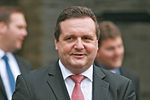
|
| Since May 12, 2011 | Winfried Kretschmann | Alliance 90 / The Greens | Cabinet Kretschmann I , II |

|
|
Bavaria
Maximilianeum , seat of the state parliament in the state capital Munich
| Term of office | Prime Minister | Political party | government | Remarks | image |
|---|---|---|---|---|---|
| May 28, 1945 - September 28, 1945 |
Fritz Schäffer | CSU | Schäffer cabinet | Appointed by the USA |
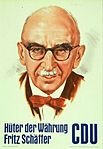
|
| September 28, 1945 - December 21, 1946 |
Wilhelm Hoegner | SPD | Cabinet Hoegner I | Appointed by the USA |

|
| December 21, 1946 - December 14, 1954 |
Hans Ehard | CSU | Cabinet Ehard I , II , III |

|
|
| December 14, 1954 - October 16, 1957 |
Wilhelm Hoegner | SPD | Cabinet Hoegner II | Resignation after losing the majority in the state parliament | |
| October 16, 1957 - January 26, 1960 |
Hanns Seidel | CSU | Cabinet Seidel I , II | Resignation for health reasons |

|
| January 26, 1960 - December 11, 1962 |
Hans Ehard | CSU | Cabinet Ehard IV | ||
| December 11, 1962 - November 7, 1978 |
Alfons Goppel | CSU | Cabinet Goppel I , II , III , IV |
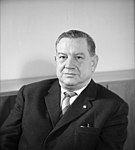
|
|
| November 7, 1978 - October 3, 1988 |
Franz Josef Strauss | CSU | Cabinet Strauss I , II , III | Died in office |

|
| October 19, 1988 - May 28, 1993 |
Max Streibl | CSU | Cabinet Streibl I , II | Resignation because of the so-called " Amigo Affair " |
 Streibl (middle) |
| May 28, 1993 - October 9, 2007 |
Edmund Stoiber | CSU | Cabinet Stoiber I , II , III , IV | resignation |

|
| October 9, 2007 - October 27, 2008 |
Günther Beckstein | CSU | Beckstein cabinet | Resignation from office after significant loss of votes by the CSU in the state elections in 2008 |

|
| October 27, 2008 - March 13, 2018 |
Horst Seehofer | CSU | Cabinet Seehofer I , II | Resignation due to the upcoming appointment as Federal Minister of the Interior, for Building and Home Affairs |

|
| Since March 16, 2018 | Markus Söder | CSU | Cabinet Söder I , II |

|
Berlin
Prussian Landtag , seat of the Berlin House of Representatives
| 1945 to 1948: | |||||
|---|---|---|---|---|---|
| Greater Berlin | |||||
| Term of office | Lord Mayor | Political party | magistrate | Remarks | image |
| May 17, 1945 - December 5, 1946 |
Arthur Werner | independent | Magistrate Werner | Appointed by the USSR |

|
| December 5, 1946 - April 17, 1947 |
Otto Ostrowski | SPD | Magistrate Ostrowski | Voted out by the city council at the request of its own parliamentary group by means of a vote of no confidence due to differences over how to deal with the SED | |
| May 8, 1947 - December 7, 1948 |
Louise Schroeder | SPD | Magistrate Schroeder | acting; Ernst Reuter was elected Lord Mayor on June 24, 1947, but was not allowed to take office due to the veto of the Soviet military administration |

|
| 1948 to 1991: The political status of Berlin after 1948 is complicated. West Berlin was de facto equal to a Land of the Federal Republic of Germany in many areas , but still formally under the Allied Occupation Statute with certain restrictions. Among other things, there was no conscription in West Berlin, and the West Berlin representatives in the German Bundestag and Bundesrat only had limited voting rights. After the administrative reform of 1952, there were no more states in the GDR, only districts . As the capital of the GDR, East Berlin did not belong to any district and did not form a separate district, but was increasingly treated as a district in administrative practice. |
|||||
| West Berlin | |||||
| Term of office | Governing Mayor (until January 11, 1951: Lord Mayor) |
Political party | senate | Remarks | image |
| December 7, 1948 - September 29, 1953 |
Ernst Reuter | SPD | Senate Reuter | Died in office |

|
| October 22, 1953 - January 11, 1955 |
Walther Schreiber | CDU | Senate clerk | Loss of office due to electoral defeat |

|
| January 11, 1955 - August 30, 1957 |
Otto Suhr | SPD | Senate Suhr | Died in office |

Otto Suhr (center) |
| August 30, 1957 - October 3, 1957 |
Franz Amrehn | CDU | Senate Suhr | provisional |
 Franz Amrehn (left) Franz Amrehn (left)
|
| October 3, 1957 - December 1, 1966 |
Willy Brandt | SPD | Senate Brandt I , II , III | Resignation due to the upcoming appointment as Federal Minister for Foreign Affairs and Deputy Federal Chancellor |
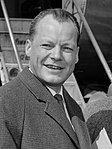
|
| December 14, 1966 - October 19, 1967 |
Heinrich Albertz | SPD | Senate Albertz I , II | Provisional from December 1, 1966. Resignation due to the shooting of Benno Ohnesorg at the demonstration on June 2, 1967 in West Berlin |

|
| October 19, 1967 - May 2, 1977 |
Klaus Schütz | SPD | Senate Schütz I , II , III | Resignation after several financial scandals |

|
| May 2, 1977 - January 23, 1981 |
Dietrich Stobbe | SPD | Senate Stobbe I , II | Resigned after a Senate reshuffle in the House of Representatives that became necessary as a result of the Garski affair failed |
 Dietrich Stobbe (right) Dietrich Stobbe (right)
|
| January 23, 1981 - June 11, 1981 |
Hans-Jochen Vogel | SPD | Senate bird | Loss of office due to electoral defeat |

|
| June 11, 1981 - February 9, 1984 |
Richard von Weizsäcker | CDU | Weizsäcker Senate | Resignation because of his upcoming election as Federal President of the Federal Republic of Germany |

|
| February 9, 1984 - March 16, 1989 |
Eberhard Diepgen | CDU | Senate Diepgen I , II | Loss of office due to electoral defeat |

|
| March 16, 1989 - January 24, 1991 |
Walter Momper | SPD | Senate Momper | Loss of office due to electoral defeat |

|
| from 1991: | |||||
| Berlin (after reunification) | |||||
| January 24, 1991 - June 16, 2001 |
Eberhard Diepgen | CDU | Senate Diepgen III , IV , V | Voted out by a constructive vote of no confidence |

|
| June 16, 2001 - December 11, 2014 |
Klaus Wowereit | SPD | Senate Wowereit I , II , III , IV | resignation |

|
| Since December 11, 2014 | Michael Mueller | SPD | Senate Müller I , II |

|
|
Brandenburg
City palace , seat of the state parliament in the state capital Potsdam
| Term of office | Prime Minister | Political party | government | Remarks | image |
|---|---|---|---|---|---|
| July 4, 1945 - October 1949 |
Karl Steinhoff | SED / SPD | Steinhoff cabinet | Appointed by the USSR; October 1949 Interior Minister of the GDR |
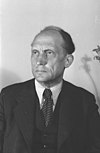
|
| December 5, 1949 - July 23, 1952 |
Rudolf Jahn | SED | Cabinet Jahn I , II |

Rudolf Jahn (right) |
|
| From July 25, 1952 to October 3, 1990, the state of Brandenburg was suspended. | |||||
| November 1, 1990 - June 25, 2002 |
Manfred Stolpe | SPD | Cabinet Stolpe I , II , III | resignation |
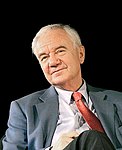
|
| June 25, 2002 - August 28, 2013 |
Matthias Platzeck | SPD | Cabinet Platzeck I , II , III | Resignation for health reasons |

|
| Since August 28, 2013 | Dietmar Woidke | SPD | Cabinet Woidke I , II , III |

|
|
Bremen
House of Citizenship, seat of the Bremen Citizenship
| Term of office | Mayor and President of the Senate | Political party | senate | Remarks | image |
|---|---|---|---|---|---|
| May 4, 1945 - July 31, 1945 |
Erich Vagts | independent | Senate Vagts | Appointed by the USA | |
| August 1, 1945 - July 19, 1965 |
Wilhelm Kaisen | SPD | Senate Kaisen I , II , III , IV , V , VI , VII | Appointed by the USA, democratically confirmed in 1947 |

|
| July 20, 1965 - November 27, 1967 |
Willy Dehnkamp | SPD | Senate Dehnkamp |

|
|
| November 28, 1967 - September 17, 1985 |
Hans Koschnick | SPD | Senate Koschnick I , II , III , IV , V |
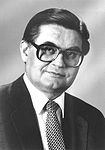
|
|
| September 18, 1985 - July 3, 1995 |
Klaus Wedemeier | SPD | Senate Wedemeier I , II , III | Resignation from office after significant loss of votes by the SPD in the 1995 state elections |
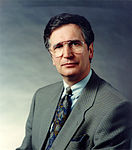
|
| July 4, 1995 - November 7, 2005 |
Henning Scherf | SPD | Senate Scherf I , II , III | Resignation for reasons of age |

|
| November 7, 2005 - July 15, 2015 |
Jens Boehrnsen | SPD | Senate Böhrnsen I , II , III | Resignation from office after significant loss of votes by the SPD in the 2015 general election |

|
| July 15, 2015 - August 15, 2019 |
Carsten Sieling | SPD | Senate Sieling | Resignation from office after significant loss of votes by the SPD in the 2019 general election |

|
| Since August 15, 2019 | Andreas Bovenschulte | SPD | Senate Bovenschulte |

|
Hamburg
Hamburg City Hall , seat of the citizenship and the Senate
| Term of office | First Mayor and President of the Senate | Political party | senate | Remarks | image |
|---|---|---|---|---|---|
| May 15, 1945 - November 15 (22), 1946 |
Rudolf Petersen |
CDU (from June 1946) |
Senate Petersen | Appointed by the United Kingdom | |
| November 15 (22), 1946 - December 2, 1953 |
Max Brewer | SPD | Senate Brauer I , II | Senate election November 15, 1946 (swearing in November 22) by the Hamburg citizenship . After the state election in 1953 deselection by vote of no confidence |
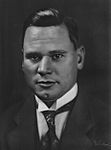
|
| December 2, 1953 - December 4, 1957 |
Kurt Sieveking | CDU | Senate Sieveking |

|
|
| December 4, 1957 - December 31, 1960 |
Max Brewer | SPD | Senate Brewer III | Resignation and agreed handover to a younger successor within the electoral term | |
| January 1, 1961 - June 9, 1965 |
Paul Nevermann | SPD | Senate Nevermann I , II | Resignation due to press scandal after a state visit (non-compliance with "protocol obligations" of the separated wife) |

Paul Nevermann (left) |
| June 9, 1965 - June 9, 1971 |
Herbert Weichmann | SPD | Senate Weichmann I , II , III | Resignation for reasons of age |

|
| June 9, 1971 - November 4, 1974 |
Peter Schulz | SPD | Senate Schulz I , II | Resignation because of the poor performance of the SPD in the 1974 general election |

|
| November 12, 1974 - May 25, 1981 |
Hans-Ulrich Klose | SPD | Senate Klose I , II | Resignation due to internal party disputes over the Brokdorf nuclear power plant |

|
| June 24, 1981 - June 8, 1988 |
Klaus von Dohnanyi | SPD | Senate of Dohnanyi I , II , III , IV | Temporarily minority or provisional Senate due to a lack of majorities after the citizenship elections in 1982 and 1986 |

|
| June 8, 1988 - October 8, 1997 |
Henning Voscherau | SPD | Senate Voscherau I , II , III | Resignation after significant loss of votes by the SPD in the 1997 general election |

|
| November 12, 1997 - October 30, 2001 |
Ortwin round | SPD | Senate round | First head of government directly elected by the Hamburg citizenship .
Loss of office due to electoral defeat |

|
| October 31, 2001 - August 25, 2010 |
Ole von Beust | CDU | Senate of Beust I , II , III | Resigns halfway through his third term |

|
| August 25, 2010 - March 7, 2011 |
Christoph Ahlhaus | CDU | Senate Ahlhaus | From November 29, 2010 to March 7, 2011 with a minority government.
Loss of office due to electoral defeat |
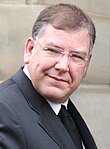
|
| March 7, 2011 - March 13, 2018 |
Olaf Scholz | SPD | Senate Scholz I , II | Resignation due to the appointment as Federal Minister of Finance and Deputy Federal Chancellor |

|
| Since March 28, 2018 | Peter Tschentscher | SPD | Tschentscher Senate I , II |

|
Hesse
City palace , seat of the state parliament in the state capital Wiesbaden
| Term of office | Prime Minister | Political party | government | Remarks | image |
|---|---|---|---|---|---|
| 1945 to 1946: | |||||
| Greater Hessen | |||||
| October 16, 1945 - November 30, 1946 |
Karl Geiler | independent | Cabinet Geiler | Appointed by the USA | |
| from 1946: | |||||
| Hesse | |||||
| December 20, 1946 - December 14, 1950 |
Christian Stock | SPD | Cabinet floor |
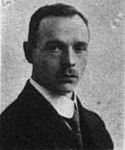
|
|
| December 14, 1950 - October 3, 1969 |
Georg-August Zinn | SPD | Cabinet pewter I , II , III , IV , V |

Georg-August Zinn (center) |
|
| October 3, 1969 - October 3, 1976 |
Albert Osswald | SPD | Cabinet Osswald I , II , III | Resignation due to the Helaba scandal |

|
| October 12, 1976 - April 23, 1987 |
Holger Borner | SPD | Cabinet Börner I , II , III | Managing director from December 1, 1982 to July 4, 1984.
To state election in 1987 did not stand as the leading candidate of his party |

|
| April 23, 1987 - April 5, 1991 |
Walter Wallmann | CDU | Wallmann's cabinet | Loss of office due to electoral defeat |
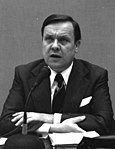
|
| April 5, 1991 - April 7, 1999 |
Hans Eichel | SPD | Cabinet Eichel I , II | Loss of office due to electoral defeat |
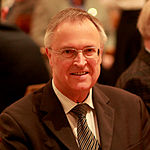
|
| April 7, 1999 - August 31, 2010 |
Roland Koch | CDU | Cabinet Koch I , II , III | Managing director from April 5, 2008 to February 5, 2009.
Resignation due to an upcoming appointment as a member of the Executive Board at Bilfinger Berger |

|
| Since August 31, 2010 | Volker Bouffier | CDU | Cabinet Bouffier I , II , III |

|
|
Mecklenburg-Western Pomerania
Schwerin Castle , seat of the state parliament in the state capital Schwerin
| Term of office | Prime Minister | Political party | government | Remarks | image |
|---|---|---|---|---|---|
| From December 9, 1946 to July 23, 1952, the state was called Mecklenburg . | |||||
| July 4, 1945 - July 19, 1951 |
Wilhelm Höcker | SPD / SED | Cabinet Höcker I , II | Appointed by the USSR | |
| July 19, 1951 - July 28, 1951 |
Kurt Bürger | SED | Cabinet Citizens | ||
| August 24, 1951 - July 23, 1952 |
Bernhard Quandt | SED | Quandt's cabinet |
 Bernhard Quandt (left) |
|
| From July 25, 1952 to October 3, 1990, the state of Mecklenburg was suspended. | |||||
| October 27, 1990 - March 18, 1992 |
Alfred Gomolka | CDU | Gomolka Cabinet | Resignation due to the so-called " shipyard crisis " |

|
| March 19, 1992 - November 2, 1998 |
Berndt page | CDU | Cabinet page I , II | Loss of office due to electoral defeat |

|
| November 3, 1998 - October 5, 2008 |
Harald Ringstorff | SPD | Cabinet Ringstorff I , II , III | Resignation for reasons of age |

|
| October 5, 2008 - July 4, 2017 |
Erwin Sellering | SPD | Cabinet Sellering I , II , III | Resignation for health reasons |

|
| Since July 4th 2017 | Manuela Schwesig | SPD | Schwesig cabinet |

|
|
Lower Saxony
Leineschloss , seat of the state parliament in the state capital Hanover
| Term of office | Prime Minister | Political party | government | Remarks | image |
|---|---|---|---|---|---|
| Predecessor countries 1945/46: | |||||
| Braunschweig | |||||
| May 1945 - May 7, 1946 |
Hubert Schlebusch | SPD | Schlebusch cabinet |

|
|
| May 7, 1946 - November 23, 1946 |
Alfred Kubel | SPD | Cabinet Kubel |

Alfred Kubel (left) |
|
| Hanover | |||||
| August 23, 1946 - December 9, 1946 |
Hinrich Wilhelm Kopf | SPD | Cabinet head | Appointed by the United Kingdom |

|
| Oldenburg | |||||
| May 1945 - November 23, 1946 |
Theodor Tantzen | FDP | Cabinet Tantzen II |
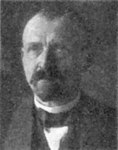
|
|
| Schaumburg-Lippe | |||||
| June 1945 - April 30, 1946 |
Heinrich Drake | independent | Cabinet Drake I. | Appointed by the United Kingdom; at the same time Prime Minister (official title: State President) of Lippe |

|
| from 1946: | |||||
| Lower Saxony | |||||
| Term of office | Prime Minister | Political party | government | Remarks | image |
| November 23, 1946 - May 26, 1955 |
Hinrich Wilhelm Kopf | SPD | Cabinet head I , II , III , IV | Appointed by the United Kingdom |

|
| May 26, 1955 - May 12, 1959 |
Heinrich Hellwege | DP | Hellwege cabinet I , II | Loss of office due to electoral defeat | |
| May 12, 1959 - December 21, 1961 |
Hinrich Wilhelm Kopf | SPD | Cabinet head V | Died in office | |
| December 29, 1961 - July 8, 1970 |
Georg Diederichs | SPD | Diederich's cabinet I , II , III , IV |

|
|
| July 8, 1970 - February 6, 1976 |
Alfred Kubel | SPD | Cabinet Kubel I , II | Resignation for reasons of age |
 Alfred Kubel (left) |
| February 6, 1976 - June 21, 1990 |
Ernst Albrecht | CDU | Cabinet Albrecht I , II , III , IV , V | Loss of office due to electoral defeat |

|
| June 21, 1990 - October 27, 1998 |
Gerhard Schröder | SPD | Cabinet Schröder I , II , III | Resignation due to upcoming election as Chancellor of the Federal Republic of Germany |
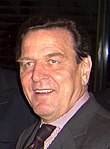
|
| October 28, 1998 - December 15, 1999 |
Gerhard Glogowski | SPD | Glogowski's cabinet | Resignation after allegations of taking advantage | |
| December 15, 1999 - March 4, 2003 |
Sigmar Gabriel | SPD | Cabinet Gabriel | Loss of office due to electoral defeat |
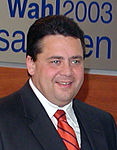
|
| March 4, 2003 - June 30, 2010 |
Christian Wulff | CDU | Cabinet Wulff I , II | Resignation due to the assumption of the office of Federal President of the Federal Republic of Germany |

|
| June 30, 2010 - July 1, 2010 |
Jörg Bode | FDP | Cabinet Wulff II | provisional |

|
| July 1, 2010 - February 19, 2013 |
David McAllister | CDU | McAllister Cabinet | Loss of office due to electoral defeat |

|
| Since February 19, 2013 | Stephan Weil | SPD | Cabinet Weil I , II |

|
|
North Rhine-Westphalia
State parliament in the state capital Düsseldorf
| Term of office | Prime Minister | Political party | government | Remarks | image |
|---|---|---|---|---|---|
| lip | |||||
| May 1945 - January 21, 1947 |
Heinrich Drake | independent | Cabinet Drake VIII | Appointed by the United Kingdom; at the same time Prime Minister (official title: State President) of Schaumburg-Lippe (from June 1945 to April 1946) |

|
| Term of office | Prime Minister | Political party | government | Remarks | image |
|---|---|---|---|---|---|
| North Rhine-Westphalia | |||||
| August 30, 1946 - April 19, 1947 |
Rudolf Amelunxen | independent, from 1947 center |
Cabinet Amelunxen I , II | Appointed by the United Kingdom |

|
| June 16, 1947 - February 19, 1956 |
Karl Arnold | CDU | Cabinet Arnold I , II , III | Voted out by a constructive vote of no confidence |

|
| February 20, 1956 - July 20, 1958 |
Fritz Steinhoff | SPD | Steinhoff cabinet | Loss of office due to electoral defeat |

|
| July 21, 1958 - December 7, 1966 |
Franz Meyers | CDU | Meyer's cabinet I , II , III | Voted out by a constructive vote of no confidence |

|
| December 8, 1966 - September 19, 1978 |
Heinz Kühn | SPD | Cabinet Kühn I , II , III |

|
|
| September 20, 1978 - May 26, 1998 |
Johannes Rau | SPD | Cabinet Rau I , II , III , IV , V |

|
|
| May 27, 1998 - October 20, 2002 |
Wolfgang Clement | SPD | Cabinet Clement I , II | Resignation due to upcoming appointment as Federal Minister for Economics and Labor |

|
| October 21, 2002 - November 5, 2002 |
Michael Vesper | Green | Cabinet Clement II | provisional |
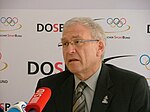
|
| November 6, 2002 - June 21, 2005 |
Peer Steinbruck | SPD | Steinbrück Cabinet | Loss of office due to electoral defeat |

|
| June 21, 2005 - July 14, 2010 |
Jürgen Rüttgers | CDU | Rüttger's cabinet | Loss of office due to electoral defeat |

|
| July 14, 2010 - June 27, 2017 |
Hannelore Kraft | SPD | Cabinet Kraft I , II | From July 14, 2010 to June 20, 2012 with a minority government
Loss of office due to electoral defeat |

|
| Since June 27, 2017 | Armin Laschet | CDU | Laschet cabinet |

|
|
Rhineland-Palatinate
Deutschhaus , seat of the state parliament in the state capital Mainz
| Term of office | Prime Minister | Political party | government | Remarks | image |
|---|---|---|---|---|---|
| December 1, 1946 - July 8, 1947 |
Wilhelm Boden | CDU | Cabinet floor I , II | Appointed by France |

|
| July 9, 1947 - May 18, 1969 |
Peter Altmeier | CDU | Cabinet Altmeier I , II , III , IV , V , VI | The longest uninterrupted term of office of all German Prime Ministers after 1945 |

|
| May 19, 1969 - December 1, 1976 |
Helmut Kohl | CDU | Cabinet Kohl I , II , III | Resignation due to taking over the chairmanship of the CDU / CSU parliamentary group in the German Bundestag |

|
| December 2, 1976 - December 7, 1988 |
Bernhard Vogel | CDU | Cabinet Vogel I , II , III , IV | Resignation due to internal party disputes |

|
| December 8, 1988 - May 20, 1991 |
Carl-Ludwig Wagner | CDU | Cabinet Wagner | Loss of office due to electoral defeat |

Carl-Ludwig Wagner (center) |
| May 21, 1991 - October 26, 1994 |
Rudolf Scharping | SPD | Scharping cabinet | Resignation due to taking over the chairmanship of the SPD parliamentary group in the German Bundestag |

|
| October 26, 1994 - January 16, 2013 |
Kurt Beck | SPD | Cabinet Beck I , II , III , IV , V | Resignation for health reasons |

|
| Since January 16, 2013 | Malu Dreyer | SPD | Dreyer cabinet I , II |

|
Saarland
Flag from 1947 to 1956
State parliament in the state capital Saarbrücken
| Term of office | Prime Minister | Political party | government | Remarks | image |
|---|---|---|---|---|---|
| October 20, 1946 - December 20, 1947 |
Erwin Müller | CVP | Administrative commission | Chairman of the Administrative Commission | |
| Saarland with the constitution of 1947 as an autonomous area: | |||||
| December 15, 1947 - October 23, 1955 |
Johannes Hoffmann | CVP | Cabinet Hoffmann I , II , III , IV |

|
|
| October 29, 1955 - January 10, 1956 |
Heinrich Welsch | independent | Cabinet Welsch | Transitional Cabinet | |
| January 10, 1956 - March 26, 1957 |
Hubert Ney | CDU | Cabinet Ney | ||
| Saarland after joining the Federal Republic of Germany in 1957: | |||||
| June 4, 1957 - April 23, 1959 |
Egon Reinert | CDU | Cabinet Reinert I , II | Died in office | |
| April 30, 1959 - June 25, 1979 |
Franz-Josef Röder | CDU | Cabinet Röder I , II , III , IV , V , VI | Died in office |

Franz-Josef Röder (right) |
| June 26, 1979 - July 4, 1979 |
Werner Klumpp | FDP | Cabinet Röder VI | provisional |

|
| July 5, 1979 - April 8, 1985 |
Werner Zeyer | CDU | Cabinet Zeyer I , II , III | Loss of office due to electoral defeat |

|
| April 9, 1985 - October 27, 1998 |
Oskar Lafontaine | SPD | Lafontaine cabinet I , II , III | Resignation due to the upcoming appointment as Federal Minister of Finance |

|
| November 10, 1998 - September 28, 1999 |
Reinhard Klektiven | SPD | Cabinet climbs | Loss of office due to electoral defeat |

|
| September 28, 1999 - August 10, 2011 |
Peter Müller | CDU | Cabinet Müller I , II , III | Resignation due to upcoming election as judge at the Federal Constitutional Court | |
| August 10, 2011 - March 1, 2018 |
Annegret Kramp-Karrenbauer | CDU | Cabinet Kramp-Karrenbauer I , II , III | Resignation due to election as General Secretary of the CDU |

|
| Since March 1, 2018 | Tobias Hans | CDU | Cabinet Hans |
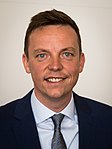
|
|
Saxony
State parliament in the state capital Dresden
| Term of office | Prime Minister | Political party | government | Remarks | image |
|---|---|---|---|---|---|
| July 4, 1945 - June 13, 1947 |
Rudolf Friedrichs | SPD / SED | Cabinet of Friedrich I , II | Appointed by the USSR.
Died in office |
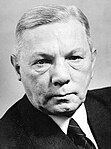
|
| July 30, 1947 - July 23, 1952 |
Max Seydewitz | SED | Cabinet Seydewitz I , II |

|
|
| The state of Saxony was suspended from July 25, 1952 to October 3, 1990. | |||||
| October 27, 1990 - April 18, 2002 |
Kurt Biedenkopf | CDU | Cabinet Biedenkopf I , II , III | resignation |

|
| April 18, 2002 - May 28, 2008 |
Georg Milbradt | CDU | Cabinet Milbradt I , II | Resignation due to the Sachsen LB affair |
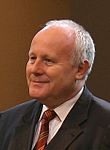
|
| May 28, 2008 - December 13, 2017 |
Stanislaw Tillich | CDU | Cabinet Tillich I , II , III | resignation |

|
| Since December 13, 2017 | Michael Kretschmer | CDU | Cabinet Kretschmer I , II |

|
|
Saxony-Anhalt
State parliament in the state capital Magdeburg
Palais am Fürstenwall , seat of the State Chancellery in Magdeburg
| Term of office | Prime Minister | Political party | government | Remarks | image |
|---|---|---|---|---|---|
| July 16, 1945 - October 1, 1949 |
Erhard Hubener | LDPD | Cabinet Hübener I , II | The first cabinet was appointed by SMAD | |
| October 10, 1949 - July 23, 1952 |
Werner Bruschke | SED | Cabinet Bruschke I , II |
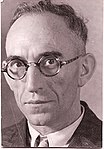
|
|
| The state of Saxony-Anhalt was suspended from July 25, 1952 to October 3, 1990. | |||||
| October 28, 1990 - July 4, 1991 |
Gerd Gies | CDU | Cabinet Gies | resignation |
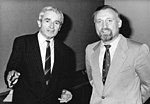
Gerd Gies (right) |
| July 4, 1991 - November 28, 1993 |
Werner Münch | CDU | Münch cabinet | Resignation because of the so-called " salary affair " |

|
| December 2, 1993 - July 21, 1994 |
Christoph Bergner | CDU | Bergner cabinet | Loss of office due to electoral defeat |

|
| July 21, 1994 - May 16, 2002 |
Reinhard Höppner | SPD | Cabinet Höppner I , II | Loss of office due to electoral defeat |
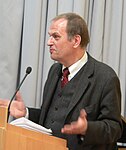
|
| May 16, 2002 - April 19, 2011 |
Wolfgang Böhmer | CDU | Cabinet Böhmer I , II | To state election in 2011 did not stand as the leading candidate of his party |

|
| Since April 19, 2011 | Pure Haseloff | CDU | Cabinet Haseloff I , II |

|
|
Schleswig-Holstein
State House , seat of the State Parliament in the state capital Kiel
| Term of office | Prime Minister | Political party | government | Remarks | image |
|---|---|---|---|---|---|
| November 15, 1945 - April 19, 1947 |
Theodor Steltzer | CDU | Cabinet Steltzer I , II | Appointed by the United Kingdom (as Chief President until 23 August 1946) | |
| April 29, 1947 - August 29, 1949 |
Hermann Lüdemann | SPD | Cabinet Lüdemann |

|
|
| August 29, 1949 - September 5, 1950 |
Bruno Diekmann | SPD | Cabinet Diekmann | ||
| September 5, 1950 - June 25, 1951 |
Walter Bartram | CDU | Bartram cabinet | resignation |

|
| June 25, 1951 - October 11, 1954 |
Friedrich Wilhelm Luebke | CDU | Cabinet Lübke I , II | Resignation for health reasons | |
| October 11, 1954 - January 7, 1963 |
Kai-Uwe von Hassel | CDU | Cabinet of Hassel I , II | Resignation due to the upcoming appointment as Federal Minister of Defense |

|
| Jan. 7, 1963 - May 24, 1971 |
Helmut Lemke | CDU | Cabinet Lemke I , II | Resignation after the state elections in 1971 and change to the office of state parliament president |

|
| May 24, 1971 - October 4, 1982 |
Gerhard Stoltenberg | CDU | Cabinet Stoltenberg I , II , III | Resignation due to the upcoming appointment as Federal Minister of Finance |

|
| October 14, 1982 - October 2, 1987 |
Uwe Barschel | CDU | Cabinet Barschel I , II | Resignation because of the so-called " Barschel Affair " |

|
| October 2, 1987 - May 31, 1988 |
Henning Schwarz | CDU | Cabinet black | provisional | |
| May 31, 1988 - May 4, 1993 |
Bjorn Engholm | SPD | Cabinet Engholm I , II | Resignation because of the so-called " drawer affair " |

|
| May 19, 1993 - April 27, 2005 |
Heath Simonis | SPD | Cabinet Simonis I , II , III | First woman as elected head of government in a German country.
Withdrawal from state politics after the formation of a red-green minority government failed |

|
| April 27, 2005 - June 12, 2012 |
Peter Harry Carstensen | CDU | Cabinet Carstensen I , II | To state election in 2012 did not stand as the leading candidate of his party |
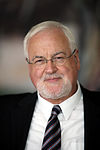
|
| June 12, 2012 - June 28, 2017 |
Torsten Albig | SPD | Cabinet Albig | Loss of office due to electoral defeat |

|
| Since June 28, 2017 | Daniel Günther | CDU | Cabinet Günther |

|
Thuringia
State parliament in the state capital Erfurt
| Term of office | Prime Minister | Political party | government | Remarks | image |
|---|---|---|---|---|---|
| June 15th - July 15th 1945 |
Hermann Brill | SPD | Cabinet Brill | Appointed by the USA and in July 1945 by the USSR |

|
| July 16, 1945 - September 1, 1947 |
Rudolf Paul | Independent / SED | Cabinet Paul I , II | Appointed by the USSR | |
| October 9, 1947 - July 23, 1952 |
Werner Eggerath | SED | Cabinet Eggerath I , II | Semi-free election (1946) , fake election 1950 |

|
| From July 25, 1952 to October 3, 1990, the state of Thuringia was suspended. | |||||
| November 8, 1990 - February 5, 1992 |
Josef Duchač | CDU | Duchač cabinet | Resignation due to lack of support in his party |

|
| February 5, 1992 - June 5, 2003 |
Bernhard Vogel | CDU | Cabinet Vogel I , II , III | Resignation for reasons of age |

|
| June 5, 2003 - October 30, 2009 |
Dieter Althaus | CDU | Cabinet Althaus I , II | Resignation after significant loss of votes by the CDU in the 2009 state elections |

|
| October 30, 2009 - December 5, 2014 |
Christine Lieberknecht | CDU | Cabinet Lieberknecht | After the state elections in 2014 , the previous coalition partner, the SPD, decided against further cooperation |

|
| December 5, 2014 - February 5, 2020 |
Bodo Ramelow | left | Cabinet Ramelow I | Attempt of a red-red-green minority government after the state elections in 2019 , but in the third ballot for the office of prime minister with 44 to 45 votes defeated the competitor of the FDP |

|
| February 5, 2020 - March 4, 2020 |
Thomas Kemmerich | FDP | no cabinet | Resigned on February 8, 2020 due to the controversy surrounding the circumstances of his election . Then executive in office. |

|
| since March 4, 2020 | Bodo Ramelow | left | Cabinet Ramelow II | Minority government |
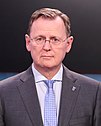
|
particularities
Prime Ministers per country
Most of the regularly elected (i.e. not appointed by the occupying powers or acting on a provisional basis) heads of government have seen the states of Hamburg and Schleswig-Holstein, where the thirteenth First Mayor and Prime Minister are currently in power. In Bavaria the twelfth Prime Minister is currently in office and in Berlin (West) there were also twelve different governing mayors (from 1948 to 1991). In contrast, Malu Dreyer is only the seventh elected head of government in Rhineland-Palatinate. That is the lowest number if you consider the countries that have belonged to the Federal Republic in unchanged form since 1949.
The mayors of Berlin (East) and the Prime Ministers of the five eastern German states between 1949 and 1952 were not taken into account in this count. Among the eastern German states, Saxony-Anhalt and Thuringia are the record holders with six prime ministers each. Brandenburg was governed most continuously (three Prime Ministers). If you count only the governing mayors in Berlin from 1990, i.e. from the first election to the House of Representatives after the unification of the previously divided city, you come to three.
Administration with interruption
A number of people have held the office of head of government intermittently.
Even before the Nazi era, Heinrich Drake was chairman of the state presidium in the Free State of Lippe in a position comparable to that of a prime minister, until he was replaced by a state government led by the NSDAP in 1933 and was briefly a member of the Reichstag. In 1945 the Allies made him head of government in Lippe and, for a short time, in Schaumburg-Lippe . The latter opened up in Lower Saxony in 1946 . Lippe was integrated into the newly formed North Rhine-Westphalia in 1947 . As a result, Drake was not only Prime Minister of two different countries, but also involved in the dissolution of these. From 1947 to 1966 he held various regional offices.
Wilhelm Hoegner (SPD) was appointed Prime Minister of Bavaria by the US occupation forces in September 1945 . After the 1946 election , however, the CSU was by far the strongest force, whereupon the SPD entered into a coalition with the CSU as a junior partner and Hoegner remained in the government as deputy to Prime Minister Hans Ehard . In 1954, four parties under the leadership of the SPD formed a coalition against the CSU, whereby Hoegner was again prime minister. The coalition broke up in 1957, whereupon Hanns Seidel from the CSU became his successor.
Hans Ehard ( CSU ), in turn, also came to a second term. He was CSU Chairman for a few years and from 1955 President of the State Parliament, when he succeeded Hanns Seidel, who retired due to illness, in 1960 and remained in office until the end of 1962. Under his successor Alfons Goppel he remained Minister of Justice until 1966.
Hinrich Wilhelm Kopf ( SPD ) was appointed in August 1946 by the British occupying power as prime minister of the country Hanover and officiated after the merger the state of Lower Saxony until 1955. He retired then from politics, but in 1957, Interior Minister in the cabinet of Heinrich Hellwege of the DP , although its party had far fewer mandates than the SPD. In 1959 Kopf became Prime Minister again and remained in office until he died in late 1961.
Max Brauer (SPD) in Hamburg was elected first mayor in 1946 and lost this office after an election victory of the bourgeois Hamburg block . He returned in 1957 after a clear election victory, but resigned in 1960 and went into federal politics for some time.
Eberhard Diepgen ( CDU ) was elected Governing Mayor of Berlin in 1984. In the 1989 election he suffered an election defeat, in which the CDU was barely able to get the most votes and the coalition partner FDP passed the five percent hurdle , so that Walter Momper took over the office of the SPD. After reunification, the CDU was again clearly the strongest party in the 1990 election and Diepgen held office again until the coalition broke up after the Berlin banking scandal and he was voted out of office by a vote of no confidence.
Bodo Ramelow ( Die Linke ) was Prime Minister of Thuringia from 2014 to February 2020 at the head of a red-red-green coalition, which could no longer achieve a majority in the 2019 election . In the election for Prime Minister Thomas Kemmerich was surprisingly elected by the FDP, which led to a government crisis. After Kemmerich's resignation, Ramelow returned to the office of Prime Minister in March 2020.
Administration in several countries
Prime ministers of several countries after 1945 were Hinrich Wilhelm Kopf (one after the other from August to October 1946 in Hanover and from November 1946 in Lower Saxony), Heinrich Drake (simultaneously in Lippe and Schaumburg-Lippe), Alfred Kubel (1946 in Braunschweig and 1970 to 1976 in Lower Saxony ). After the formation of the state of Baden-Württemberg in 1952, two former heads of government of the predecessor countries officiated as minister-presidents of the new state: first Reinhold Maier (previously Württemberg-Baden) and then Gebhard Müller (previously Württemberg-Hohenzollern). Bernhard Vogel, who ruled in Rhineland-Palatinate and Thuringia, is so far the only politician who has ruled in two states of the Federal Republic that are neither successor states nor neighboring states.
Particularly long terms in office
The record holder after term of office in a single country is the former Rhineland-Palatinate Prime Minister Peter Altmeier, who was Prime Minister from 1947 to 1969 for a total of 21 years, ten months and nine days. Besides him, only the Saarland Prime Minister Franz-Josef Röder held office in a country for more than 20 years. The 20-year mark was narrowly missed by the Mayor of Bremen, Wilhelm Kaisen, who left office in 1965 twelve days before his twentieth anniversary in office, which would have taken place on August 1, 1965. Contrary to what is often reported in the media, Johannes Rau has also not reached his twentieth anniversary as Prime Minister in North Rhine-Westphalia. He resigned on May 27, 1998, just under four months before his jubilee, which would have taken place on September 20, 1998.
The case of the CDU politician Bernhard Vogel, who was Prime Minister in two countries: from 1976 to 1988 in Rhineland-Palatinate and from 1992 to 2003 in Thuringia, is unique. He can look back on a total of 23 years, four months and five days in office as Prime Minister and was in office longer than his predecessor Peter Altmeier in Rhineland-Palatinate.
The current head of government (since March 14, 2018) is the Prime Minister of Hesse, who has been in office since August 2010, Volker Bouffier .
Particularly short terms of office
Thomas Kemmerich (FDP) was surprisingly elected prime minister on February 5, 2020 in the election against Bodo Ramelow (left) with 45 against 44 votes. His election led to the government crisis in Thuringia in 2020 . After only 3 days in office, he resigned from his office on February 8, 2020, but remained in office as managing director. On March 4, 2020, he was replaced by his predecessor Ramelow after just 28 days.
Heinrich Welsch was Prime Minister of Saarland from October 29, 1955 to January 10, 1956 (74 days).
Hans-Jochen Vogel (SPD) became Governing Mayor of Berlin on January 23, 1981, succeeding the resigned Dietrich Stobbe . After losing the House of Representatives election , he was voted out of office on June 11, 1981 after 4 months and 19 days in office.
Christoph Ahlhaus was elected First Mayor of the Free and Hanseatic City of Hamburg on August 25, 2010 after the resignation of Ole von Beust . After losing the new election of the citizens , he was voted out of office on March 7, 2011 after 6 months and 13 days in office.
Christoph Bergner was elected Prime Minister of Saxony-Anhalt on December 2, 1993 after Werner Münch had resigned . After losing the state election in June 1994 , he was voted out of office on July 21, 1994 after 7 months and 19 days in office.
Gerd Gies (CDU) became the first Prime Minister of the re-established state of Saxony-Anhalt on October 28, 1990. Gies (and his entire government) resigned on July 4, 1991, after 9 months and 7 days in office.
Walter Bartram (CDU) became Prime Minister of Schleswig-Holstein on September 5, 1950. He resigned on June 25, 1951 after his party withdrew his trust. He was in office for 9 months and 20 days.
Prime Ministers
So far, six women have headed a German country; two are currently still in office:
- Heide Simonis (SPD) led the state government of Schleswig-Holstein from May 19, 1993 to April 27, 2005. She was the first woman to head a state nationwide. The former finance minister took office after her predecessor Björn Engholm resigned and was confirmed in office in the 1996 and 2000 state elections. In 2005 she ran again and was also able to form a red-green coalition with tolerance of the SSW , but failed in the election as prime minister because a member of the parliamentary groups that supported her refused to vote. After four failed ballots, she withdrew.
- Christine Lieberknecht (CDU) led the state government of the Free State of Thuringia from October 30, 2009 to December 5, 2014; she succeeded her party colleague Dieter Althaus, who resigned after the CDU lost a lot of votes in the 2009 state elections . After the state elections in 2014 , Bodo Ramelow (Die Linke) was elected as her successor.
- Hannelore Kraft (SPD) was elected Prime Minister of North Rhine-Westphalia on July 14, 2010. She is the first woman who succeeded in replacing an incumbent Prime Minister on the basis of a vote by the voters. However, it did not initially have its own majority, but led a red-green minority government . From November 1, 2010 to October 31, 2011, she was the first female President of the Federal Council . From the state elections in 2012 to the state elections in 2017, she ruled with a majority government. Since her coalition lost its majority in the 2017 election, Armin Laschet was elected her successor on June 27, 2017.
- Annegret Kramp-Karrenbauer (CDU) was elected Prime Minister by the Saarland state parliament on August 10, 2011 . She was previously Minister of Social Affairs in the cabinet of Prime Minister Peter Müller, who resigned the day before. She led the Jamaica coalition until the beginning of 2012, but then resigned. After early elections , she led a grand coalition made up of CDU and SPD, which was confirmed in office after the 2017 state elections . After her election as CDU General Secretary, she resigned as Prime Minister at the end of February 2018.
- Malu Dreyer (SPD) was elected Prime Minister by the Rhineland-Palatinate state parliament on January 16, 2013. She was previously Minister for Social Affairs, Labor, Health and Demography in the cabinet of her predecessor Kurt Beck. Dreyer was confirmed in office after the state elections in 2016.
- Manuela Schwesig (SPD) was elected Prime Minister of Mecklenburg-Western Pomerania on July 4, 2017 after Erwin Sellering's resignation due to health reasons. She was previously represented under Sellering as a minister in the state government from 2008 to 2013 and was Federal Minister for Family, Seniors, Women and Youth from 2013 to 2017 .
Top candidates
Including the aforementioned politicians, the following women have run as candidates from established parties in elections to the state parliament for the office of head of government (or have already been nominated as top candidates of their parties for upcoming elections):
- Rita Süssmuth ( CDU ) in Lower Saxony in 1990 (although it was agreed that incumbent Ernst Albrecht would serve as Prime Minister for two more years after the state elections and Süssmuth would succeed him in 1992)
- Anke Fuchs ( SPD ) in Saxony in 1990
- Renate Schmidt (SPD) in 1994 and 1998 in Bavaria
- Ingrid Stahmer (SPD) in Berlin in 1995
- Heide Simonis (SPD) in 1996 , 2000 and 2005 in Schleswig-Holstein
- Ute Vogt (SPD) 2001 and 2006 in Baden-Württemberg
- Cornelia Pieper ( FDP ) 2002 in Saxony-Anhalt
- Dagmar Enkelmann ( PDS ) 2004 in Brandenburg
- Andrea Ypsilanti (SPD) in Hesse in 2008
- Kerstin Kaiser ( Die Linke ) in Brandenburg in 2009
- Johanna Wanka (CDU) in Brandenburg in 2009
- Hannelore Kraft (SPD) 2010 , 2012 and 2017 in North Rhine-Westphalia
- Julia Klöckner (CDU) in 2011 and 2016 in Rhineland-Palatinate
- Rita Mohr-Lüllmann (CDU) 2011 in Bremen
- Renate Künast ( Greens ) 2011 in Berlin
- Annegret Kramp-Karrenbauer (CDU) in Saarland in 2012 and 2017
- Christine Lieberknecht (CDU) in Thuringia in 2014
- Heike Taubert (SPD) in Thuringia in 2014
- Elisabeth Motschmann (CDU) 2015 in Bremen
- Katrin Budde (SPD) in Saxony-Anhalt in 2016
- Malu Dreyer (SPD) 2016 in Rhineland-Palatinate
- Anke Rehlinger (SPD) in Saarland in 2017
- Natascha Kohnen (SPD) in Bavaria in 2018
- Katharina Fegebank (Alliance 90 / The Greens) 2020 in Hamburg
Trivia
Bernhard Vogel and Hans-Jochen Vogel were the only brothers who were prime ministers.
Party affiliations
Number of prime ministers per party at the beginning of the year. The party (s) with the highest number is (are) highlighted.
| year | CDU | CSU | SPD | LEFT | GREEN | DP | FDP |
|---|---|---|---|---|---|---|---|
| 1950 | 4th | 1 | 6th | 1 | |||
| 1951 | 5 | 1 | 5 | 1 | |||
| 1952 | 5 | 1 | 5 | 1 | |||
| 1953 | 3 | 1 | 5 | 1 | |||
| 1954 | 6th | 1 | 3 | ||||
| 1955 | 6th | 4th | |||||
| 1956 | 5 | 4th | 1 | ||||
| 1957 | 4th | 5 | 1 | ||||
| 1958 | 4th | 1 | 5 | 1 | |||
| 1959 | 5 | 1 | 4th | 1 | |||
| 1960 | 5 | 1 | 5 | ||||
| 1961 | 5 | 1 | 5 | ||||
| 1962 | 5 | 1 | 5 | ||||
| 1963 | 5 | 1 | 5 | ||||
| 1964 | 5 | 1 | 5 | ||||
| 1965 | 5 | 1 | 5 | ||||
| 1966 | 5 | 1 | 5 | ||||
| 1967 | 4th | 1 | 6th | ||||
| 1968 | 4th | 1 | 6th | ||||
| 1969 | 4th | 1 | 6th | ||||
| 1970 | 4th | 1 | 6th | ||||
| 1971 | 4th | 1 | 6th | ||||
| 1972 | 4th | 1 | 6th | ||||
| 1973 | 4th | 1 | 6th | ||||
| 1974 | 4th | 1 | 6th | ||||
| 1975 | 4th | 1 | 6th | ||||
| 1976 | 4th | 1 | 6th | ||||
| 1977 | 5 | 1 | 5 | ||||
| 1978 | 5 | 1 | 5 | ||||
| 1979 | 5 | 1 | 5 | ||||
| 1980 | 5 | 1 | 5 | ||||
| 1981 | 5 | 1 | 5 | ||||
| 1982 | 6th | 1 | 4th | ||||
| 1983 | 6th | 1 | 4th | ||||
| 1984 | 6th | 1 | 4th | ||||
| 1985 | 6th | 1 | 4th | ||||
| 1986 | 5 | 1 | 5 | ||||
| 1987 | 5 | 1 | 5 | ||||
| 1988 | 6th | 1 | 4th | ||||
| 1989 | 5 | 1 | 5 | ||||
| 1990 | 4th | 1 | 6th | ||||
| 1991 | 7th | 1 | 8th | ||||
| 1992 | 6th | 1 | 9 | ||||
| 1993 | 6th | 1 | 9 | ||||
| 1994 | 6th | 1 | 9 | ||||
| 1995 | 5 | 1 | 10 | ||||
| 1996 | 5 | 1 | 10 | ||||
| 1997 | 5 | 1 | 10 | ||||
| 1998 | 5 | 1 | 10 | ||||
| 1999 | 4th | 1 | 11 | ||||
| 2000 | 6th | 1 | 9 | ||||
| 2001 | 6th | 1 | 9 | ||||
| 2002 | 6th | 1 | 9 | ||||
| 2003 | 7th | 1 | 8th | ||||
| 2004 | 8th | 1 | 7th | ||||
| 2005 | 8th | 1 | 7th | ||||
| 2006 | 10 | 1 | 5 | ||||
| 2007 | 10 | 1 | 5 | ||||
| 2008 | 10 | 1 | 5 | ||||
| 2009 | 10 | 1 | 5 | ||||
| 2010 | 10 | 1 | 5 | ||||
| 2011 | 9 | 1 | 6th | ||||
| 2012 | 7th | 1 | 7th | 1 | |||
| 2013 | 6th | 1 | 8th | 1 | |||
| 2014 | 5 | 1 | 9 | 1 | |||
| 2015 | 4th | 1 | 9 | 1 | 1 | ||
| 2016 | 4th | 1 | 9 | 1 | 1 | ||
| 2017 | 4th | 1 | 9 | 1 | 1 | ||
| 2018 | 6th | 1 | 7th | 1 | 1 | ||
| 2019 | 6th | 1 | 7th | 1 | 1 | ||
| 2020 | 6th | 1 | 7th | 1 | 1 | ||
| current | 6th | 1 | 7th | 1 | 1 |
So far most of the Prime Ministers of the federal states belonged to the parties of the SPD or CDU / CSU, exceptions are:
- The FDP / DVP politician Reinhold Maier was Prime Minister of Württemberg-Baden from 1949 to 1952 and subsequently Prime Minister of Baden-Württemberg from 1952 to 1953.
- From 1955 to 1959 Heinrich Hellwege ( German Party ) was Prime Minister of Lower Saxony.
- Winfried Kretschmann of Bündnis 90 / Die Grünen has been Prime Minister of Baden-Württemberg since May 12, 2011 .
- From December 5, 2014 to February 5, 2020, and again since March 4, 2020, Bodo Ramelow of the Left Party was Prime Minister of the Free State of Thuringia. This means that all parties represented in the Bundestag during the 18th electoral term simultaneously provided at least one Prime Minister - a novelty in the history of the Federal Republic.
- On February 5, 2020, Thomas Kemmerich was elected by the FDP as Prime Minister of the Free State of Thuringia . He replaced Bodo Ramelow from the party Die Linke. On February 8, 2020, Thomas Kemmerich resigned as Prime Minister of the Free State of Thuringia, but remained in office until March 4, 2020.
See also
- Results of the state elections in the Federal Republic of Germany
- List of the Austrian provincial governors
- List of presidents of the German Bundesrat
- List of Prussian Prime Ministers
Individual evidence
- ^ Lists of the Senate Chancellery / Press Office: First Mayor of Hamburg 1507–2008 i. V. m. Overview of the senates since 1945 and Schütt: Die Chronik Hamburgs , Chronik-Verlag 1991.















































